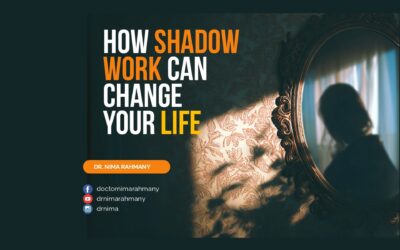I stared at my reflection in the bathroom mirror,
tears streaming down my face.
"What is wrong with me?" I whispered.
I was a successful chiropractor.
My patients loved me.
My colleagues respected me.
On paper, I had it all together.
But in my intimate relationships–
I was a disaster.
My girlfriend had just called me manipulative and selfish –
words that felt like daggers because
they were so contrary to how I saw myself
and how others seemed to experience me.
This wasn't my first toxic relationship.
It was just the latest in a pattern
that had followed me for years,
leaving me confused, heartbroken,
and increasingly convinced
that I was broken in some fundamental way.
What I didn't realize then was that I had stumbled
into one of the most profound psychological blind spots we all share –
one that would eventually transform not just my relationships,
but my entire approach to life.
Today, I hear echoes of my own story
almost daily in my practice.
Just this week, a music teacher sat across from me,
her voice catching as she said:
"Everyone tells me how wonderful I am.
My college even created a position specifically to keep me.
But at home– I'm selfish.
I'm never good enough.
I'm the villain in his story."
Perhaps you’ve felt this bewildering disconnect.
The world reflects back your competence,
kindness, and contribution.
Your partner reflects back your selfishness,
inadequacy, and flaws.
It feels like living in two separate realities –
a public one where you shine,
and a private one where you're constantly falling short.
What if I told you this isn't a coincidence
but the doorway to your freedom?
The Shadow Dance
When my relationship imploded
for what felt like the hundredth time,
I did something different.
Instead of blaming my partner
or moving on to the next relationship,
I went deep into understanding
what Carl Jung called "the shadow dance."
What I discovered was a gamechanger.
For years, I'd been living with a hidden equation:
"I am good, helpful, competent,
and worthy of love when I heal and help others."
This identity – built from childhood experiences
and reinforced by my career as a “healer” –
required me to disown crucial parts of myself:
-
My vulnerability and need for support
-
My anger (healers aren't supposed to get angry, remember)
-
My capacity to receive rather than always give
-
My selfishness and ambition
These disowned parts didn't disappear.
They went underground, creating an invisible force field
that kept attracting partners
who would reflect these exact qualities back to me.
This exposed a counter-intuitive truth to me:
Your partner doesn't see your shadow side because they're cruel.
They see it because they're designed to.
Each of us develops a self-image early in life.
For many high-achievers, this becomes:
"I am good, helpful, competent, and worthy of love when I excel."
But this identity requires pushing disowned parts of yourself –
your "shadow" – into the unconscious:
-
Your neediness
-
Your selfishness
-
Your capacity for anger
-
Your ability to disappoint others
-
Your inherent worthiness apart from achievement
The magic (and agony) of intimate partnership
is that it creates the perfect conditions for these shadows to emerge.
And until I understood this,
I was doomed to repeat the same painful patterns.
Why your partner sees your shadows (when others don’t):
Think about the differences
between casual relationships and intimate ones:
With Colleagues, Friends, and Acquaintances:
-
Interactions are time-limited
-
Boundaries are clearer
-
Expectations are lower
-
Your "best self" can be maintained
-
Your shadow remains hidden
With Your Intimate Partner:
-
Continuous proximity reveals all sides of you
-
Boundaries blur as you merge lives
-
Expectations for emotional fulfillment run deep
-
Your shadow inevitably emerges
-
Your partner becomes the mirror
reflecting what you've “disowned”
Your partner triggers and reflects your shadow
not because they're wrong about you,
but because they're experiencing parts of you
that you've denied access to your own awareness.
And here's where it gets even more interesting –
you're doing the exact same thing for them.
The Painful Perfection
One of the most fascinating patterns
I've observed in two decades of working with people in
“should I stay or go” dynamics:
We unconsciously select partners
who perfectly match our shadow dynamics.
The woman who prioritizes being "good"
and fears being "selfish" finds herself with a partner
who constantly accuses her of selfishness.
The man who prides himself on emotional strength
attracts a partner who criticizes his vulnerability.
The irony is stunning.
Your partner isn't randomly pointing out flaws –
they're highlighting precisely the parts of yourself
you've worked hardest to suppress.
This isn't “the universe punishing you”--
It's an invitation to wholeness.
What Your Partner Sees
When your partner says you're selfish,
while everyone else sees your generosity,
both perspectives contain truth.
You likely are extraordinarily generous with others.
You likely do struggle with claiming space for yourself
in your primary relationship.
The kindest teacher who puts everyone else first
may indeed struggle to prioritize her partner's needs
when they conflict with her students' or children's.
The accomplished professional everyone admires
may indeed withdraw emotionally
when feeling inadequate at home.
Your partner experiences the consequences of your shadow
in ways others never will,
because intimate partnership creates the vulnerability
that brings shadows to life.
How I found freedom
I'll never forget the day everything clicked.
I was sitting across from a mentor who asked me,
"What if your girlfriend's perception of you as selfish
isn't wrong... but incomplete?"
Something broke open in me.
Not because I suddenly decided she was right,
but because I realized both realities could be true:
I could be the caring healer everyone else saw
AND be self-centered born from my fear of scarcity.
This wasn't about blaming anyone.
It was about wholeness.
What I had been experiencing as criticism
was actually a map to freedom –
pointing directly to the “disowned” parts of myself
awaiting understanding.
Now, nothing lights me up more
than watching this same recognition dawn in my clients' eyes.
That moment when they see their relationship struggles
not as evidence of their failure,
but as breadcrumbs leading to their wholeness.
When you begin to approach your partner's perceptions
with curiosity rather than defense,
everything changes.
"You're so selfish" becomes an invitation to explore:
"Where might I need more permission to prioritize myself?
Where might I be giving to avoid vulnerability?"
"You're so critical" opens the door to:
"Where am I judging myself harshly?
What standards am I holding that may be impossible to meet?"
This work isn't about admitting your partner is "right" about you.
It's about recognizing that both perceptions –
the world's positive view and your partner's challenging one –
contain pieces of your truth.
And helping people discover this blind spot –
watching them exhale as years of confusion suddenly make sense –
is honestly the most rewarding work I've ever done.
For years, I lived in an exhausting cycle that looked like this:
-
Partner would trigger my shadow (pointing out my avoidance issues)
-
I'd defend against seeing it ("I'm just trying to fill my cup!")
-
They'd push harder to make me see it
-
I'd resist more intensely
-
The pattern would escalate
-
Both of us would feel increasingly unseen
This cycle continued across relationships,
with every partner somehow hitting the same trigger points
despite being different people.
I was the common denominator,
but I couldn't see it.
What transformed everything wasn't cognitive perception work
(though I tried that), or finding the "right person" (I tried that too),
or even communication techniques.
It was embracing shadow integration as a lifestyle –
making it a daily practice to notice,
welcome, and integrate the parts of myself I'd been running from.
When I finally acknowledged my fear of vulnerability
and my need for control, something miraculous happened.
My relationships transformed –
not because I found better partners,
but because I became whole enough to see and be seen clearly.
Now I've witnessed this same transformation hundreds of times with clients:
-
The teacher who finally embraced her right to take up space –
and found her husband's accusations of selfishness gradually dissolving -
The executive who acknowledged his fear of inadequacy –
and watched his wife's criticism of his performance soften into support -
The caretaker who reclaimed her capacity for healthy anger –
and discovered her partner no longer needed to express rage for both of them
This isn't magical thinking or traditional therapy.
It's the natural result of psychological somatic integration –
and it's the most fun I've ever had professionally,
watching people's eyes light up when they finally solve the riddle of their relationship frustrations.
When I look back at the person I was –
successful on the outside, struggling on the inside –
I feel such compassion.
I had no idea that the answer to my relationship frustrations
wasn't finding a better partner, but becoming whole myself.
Shadow integration became more than a psychological concept for me.
It became a way of life that transformed everything:
-
I began to see people’s challenging perceptions of me
not as attacks but as invitations to reclaim lost parts of myself -
I got curious about my defensive reactions,
recognizing them as signposts pointing to my shadow material -
I learned to look for the grain of truth in criticism
without spiraling into shame -
I observed how I was projecting onto my others
the very qualities I couldn't accept in myself -
I embraced “wholeness” rather than perfection as the goal
This work wasn't easy.
There were days I wanted to retreat back into my old patterns
of blame and victimhood.
The shadow exists in the unconscious
precisely because these parts of ourselves
feel dangerous to acknowledge.
But I discovered something remarkable:
bringing these parts into consciousness didn't mean they overtook me –
it meant they no longer controlled me from the shadows.
What awaited on the other side was the freedom to be whole.
To be complex.
To be human in all my contradictions.
And paradoxically, as I reclaimed my shadow,
I attracted someone into my life that reflects the goodness
that everyone else sees in me.
Not because I'd become "better,"
but because they no longer needed to hold my disowned parts for me.
My mission now is to help others discover this same freedom.
There's nothing more rewarding
than watching someone's eyes light up
when they finally understand why
they've been stuck in the same frustrating cycles –
and realize they have the power to break free.
The most beautiful relationships emerge
not between two "perfect" people,
but between two whole ones.
And that journey begins with seeing the gift hidden
in your partner's perception.
With deep respect for your journey,
your wingman on the adventure,
Nima
P.S. If you're caught in this shadow dance
and ready to break free,
I'm offering a small number of "Shadow Integration"
sessions this month (usually $497).
This is hands-down my favorite work to do –
nothing gives me more joy than helping someone see
the invisible patterns that have been controlling their life
and relationships. In our 30-minute session, we'll:
-
Map your specific shadow dynamics
and how they're playing out in your relationship -
Identify where you're projecting
and where you're receiving projections -
Develop a personalized approach
to reclaiming disowned parts of yourself
If you're tired of the same frustrating patterns
and ready to discover what shadow integration
can do for your life, reply with
Your back story about your situation
and what you've tried to resolve this– what worked and what hasn’t…
End with "Nima, can I please have your private calendar link?"
Let’s see what’s buried underneath you may have been unable to see.




